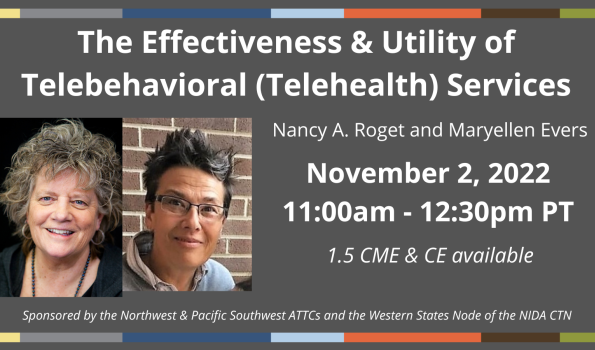CTN Standard and Common Assessments Webpage |
|
|
 The DSC's CTN Standard and Common Assessments webpage has been updated with current versions of commonly used and/or standardized assessments within CTN trials.
The DSC's CTN Standard and Common Assessments webpage has been updated with current versions of commonly used and/or standardized assessments within CTN trials.
These sample CRFs include validated assessments as well as those developed by CTN investigators in conjunction with DSC, CCC and/or CCTN, and are optimized for harmonization within the CTN and data quality within the system. This library can be found in the Investigators Toolbox section of the CTN website and can serve as a resource for planning current and future CTN studies.
· · · · · · · · · · · · · · · · · · · · · · · · · · · · · · · · · · · · · · · ·
· · · · · · · ·
NIH Style Guide: Race and National Origin
This page on the NIH website provides guidance on NIH-preferred formatting and publication styles for terms related to describing race and national origin. Here are some of the guidelines:
- Avoid using Black and White as standalone nouns. (Instead of using Blacks, use Black people, etc.)
- Capitalize all references to race, including White (this is a divergence from AP style, which NIH otherwise conforms to).
- Avoid collective reference to racial and ethnic minority groups as "non-White" unless it was a formal category in a database or research document. Instead, indicate the specific groups.
- Avoid using "race/ethnicity," as the slash implies these are interchangeable terms. Instead use "race and ethnicity" or "race or ethnicity," as appropriate.
Terms to use to describe difference races or ethnicities include:
- Alaska Native (not "Alaskan Native"), Aleuts, Eskimos, Indians of Alaska
- American Indian or Native American (whenever possible, however, specify the nation or people)
- Asian, Asian American
- Biracial, multiracial, of mixed race
- Black or African American
- Latino/a or Latinx
- Hispanic
- Chicano or Chicana
- Middle East, MENA (people of Middle Eastern or North African descent), Arab Americans
- Indigenous peoples, First peoples, First Nations, Aboriginal peoples, Native peoples
- Person of color
- Tribe, Tribal (always capitalize)
For more guidance on NIH-approved publication style, visit their Style Guide. |
CTN Trial Progress
 Randomizations for Active Studies as of the October 16 Trial Progress Report. Randomizations for Active Studies as of the October 16 Trial Progress Report.
CTN-0080 - Enrolled 106
CTN-0097 - Enrolled 415
CTN-0098 - Enrolled 87
CTN-0099 - Enrolled 1190
CTN-0099-A-1 - Enrolled 88
CTN-0100
Discontinuation - Enrolled 81
Retention - Enrolled 515
CTN-0101 - Enrolled 183
CTN-0107 - Enrolled 80
CTN-0108 - Enrolled 54
|
· · · · · · · · · · · · · · · · · · · · · · · · · · · · · · · · · · · · · · · ·
· · · · · · · · · · · · · · · · · · · · · · ·
Upcoming Events
Webinar: NIDA HIV Seminar Series: HIV, HCV, and Overdose

October 26, 2022 | 1:00-2:00pm ET | Register here
Join the NIDA HIV Research Program on October 26, 2022 (1-2pm ET) for the next installment in their HIV Seminar Series:
Addressing Structural Drivers of the Syndemics of Injecting Drug Use, HIV, HCV, and Overdose: Insights from Modeling Population Impact
Presenter Dr. Natasha Martin, DPHIL/PhD (University of California, San Diego), is an infectious disease economic modeler with over two decades of experience developing models of disease progression and transmission. Her current research focuses on modeling the population impact and cost-effectiveness of policies and programs to prevent HIV, HCV, and overdose among substance-using populations.
Register here

Webinar: The Effectiveness & Utility of Telebehavioral (Telehealth) Services
November 2, 2022 | 11am-12:30pm PT | Register here
Sponsored by the Western States Node of the NIDA CTN and the Pacific Northwest and Pacific Southwest ATTCS
The uptake in the use of telebehavioral services since the start of the Public Health Emergency (PHE) has been swift and is significantly transforming how behavioral health services are delivered. This is encouraging, as the research base for assessing and treating mental health conditions virtually is extensive and over 60 years old. However, for substance use disorders (SUDs), the research is less extensive and more recent. Mental health and SUD treatment services provided virtually are effective and serve as viable alternatives to in-person service delivery. Patients confirm high levels of satisfaction with telebehavioral health, while practitioners report more reluctance. Nonetheless, training has been shown to build practitioners’ skills, confidence, and competency.
Using technology to facilitate clinical or recovery support sessions requires clinicians and peer support specialists to simulate real-time experiences (Hilty, 2002) that promote a therapeutic alliance (treatment) or connection (peer support). However, virtual service delivery requires some careful modification of the clinicians’ or peer support specialists’ skills to ensure engagement occurs and positive working relationships are developed.
This webinar, presented by Nancy A. Roget, MS, MFT, LADC and Maryellen Evers, LCSW, CAADAC, CMFSW, will include a brief review of: telebehavioral health research and its efficacy, strategies that promote skill development, how to create a virtual presence, resources related to guidelines and tips, and comments regarding hybrid service delivery.
1.5 CME & CE will be available.
Register here | Read more about this event here
Youth SIG Webinar: Increasing the Uptake of Effective Services for Youth via Dissemination and Implementation Science
 November 11, 2022 | 11:00am - 12:00pm ET | Join meeting November 11, 2022 | 11:00am - 12:00pm ET | Join meeting
This presentation from Sara Becker, PhD (Northwestern University Feinberg School of Medicine) will describe a program of research focused on increasing the uptake of effective services for youth with or at risk of substance use disorders.
The presentation will introduce both patient-focused dissemination (e.g., technology-assisted interventions, direct-to-consumer marketing) and provider- and organization-focused (e.g., multi-level implementation strategy) strategies. Fundamentals of dissemination and implementation science, as well as priorities for future research will be discussed.
Join Zoom meeting (registration not required)
Zoom Meeting ID: 910 5122 3250
Passcode: 609671
· · · · · · · · · · · · · · · · · · · · · · · · · · · · · · · · · · · · · · · ·
· · · · · · · · · · · · · · · · · · · · · · ·
News from the Nodes
Health Systems Node

The Health Systems Node is pleased to announce the recent publication of papers from:
PROUD (CTN-0074) Sex Differences in Comorbid Mental Health and Substance Use Disorder Diagnoses Among Primary Care Patients Diagnosed with Opioid Use Disorder (Psychiatric Services),
The Prescription Opioid Registry (CTN-0084): Development and Implementation of a Prescription Opioid Registry Across Diverse Health Systems (JAMIA Open)
(CTN-0084-A-1): The Association between Buprenorphine Treatment Duration and Mortality: A Multi-site Cohort Study of People who Discontinued Treatment (Addiction).
Primary and secondary papers from PROUD will be published in the near future.
· · · · · · · · · · · · · · · · · · · · · · · · · · · · ·
Florida Node Alliance

Dr. José Szapocznik, Multiple PI of CTN's Florida Node Alliance and Professor and Chair Emeritus at the Department of Public Health Sciences, of the University of Miami Miller School of Medicine, was elected to the Academy of Science, Engineering and Medicine of Florida (ASEMFL), an evidence-based scientific advisory body focused on providing expert advice to state government and other organizations on current and future challenges facing the world and Florida.
Recognizing four and a half decades of important contributions to developing and testing interventions in the areas of mental health and drug abuse, ASEMFL elected Dr. Szapocznik for his "“"exemplary contributions to prevention science and globally impactful substance use prevention for youth and families."” "
Dr. Szapocznik's formal induction will take place during the ASEMFL's 2022 annual meeting in early November.
Please join us in congratulating Dr. Szapocznik for this prestigious accomplishment! |
Southwest Node

Dr. Kamilla Venner of the Southwest Node was awarded the Duane Mackey Award at the 2022 Great Plains Behavioral Health Conference for her presentation titled "Creating Bridges and Culturally adapting western science."
The Mackey Lecture/Award was created in 2010 by what was then known as the Prairielands Addiction Technology Transfer Center (ATTC) along with the South Dakota Prairielands ATTC Advisory Board. The lecture/award's namesake, Dr. Duane Mackey, spent his live promoting equality through education.
"The purpose of the Dr. Duane Mackey 'Waktaya Naji' Award is to acknowledge individuals who, in their addiction study careers, have made significant contributions in education, research, mentoring, and service among Native American peoples. The award signifies the promise of continued success of an individual and serves to inspire others to make contributions to the addiction treatment field for American Indian people. The award is also designed to recognize individuals who, through their concerted efforts, have untiringly promoted and espoused the ideals of equality and justice for all peoples."
Congratulations to Dr. Venner!
· · · · · · · · · · · · · · · · · · · · · · · · · · · · ·
New England Consortium Node

New England Consortium Node members Kelley Saia, MD and Elisha Wachman, MD were recently interviewed for an article on the Health City (Boston Medical Center) website titled, Can New Medication Formulations for Opioid Addiction Prevent Relapse in New Parents? Opioid use has quadrupled in pregnancy, but effective medication options remain elusive for pregnant and breastfeeding persons. Dr. Saia describes Boston Medical Center's Project RESPECT (a high-risk obstetrical and addiction recovery program), and Dr. Wachman follows with information related to care barriers facing pregnant and new mothers with OUD, the urgency to streamline care for these patients, and two new studies underway at BMC to investigate longer-acting treatment options.
Read the article here.
|
· · · · · · · · · · · · · · · · · · · · · · · · · · · · · · · · · · · · · · · ·
· · · · · · · · · · · · · · · · · · · · · · ·
New in the CTN Dissemination Library
 Relative effectiveness of social media, dating apps, and information search sites in promoting HIV self-testing: Observational cohort study. Stafylis C, et al. JMIR Formative Research 2022;6(9):e35648. Outcomes from CTN-0083 Relative effectiveness of social media, dating apps, and information search sites in promoting HIV self-testing: Observational cohort study. Stafylis C, et al. JMIR Formative Research 2022;6(9):e35648. Outcomes from CTN-0083
Five-year incidence of substance use and mental health diagnoses following exposure to opioids or opioids with benzodiazepines during an emergency department encounter for traumatic injury. Sprunger JG, et al. Drug and Alcohol Dependence 2022;238:109584.
Sex differences in comorbid mental and substance use disorders among primary care patients with opioid use disorder. Braciszewski JM, et al. Psychiatry Services 2022 (in press). CTN-0074
Time-lagged association between counseling and/or 12-step attendance with subsequent opioid use in a secondary analysis from a randomized, clinical trial of medications for opioid use disorder. Hefner K, et al. Drug and Alcohol Dependence Reports 2022 (in press). CTN-0051
· · · · · · · · · · · · · · · · · · · · · · · · · · · · · · · · · · · · · · · ·
· · · · · · · · · · · · · · · · · · · · · · ·
   
|